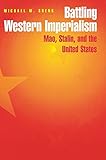Battling Western Imperialism : Mao, Stalin, and the United States / Michael M. Sheng.
Material type: TextPublisher: Princeton, NJ : Princeton University Press, [2022]Copyright date: ©1998Description: 1 online resource (267 p.)Content type:
TextPublisher: Princeton, NJ : Princeton University Press, [2022]Copyright date: ©1998Description: 1 online resource (267 p.)Content type: - 9780691223292
- HISTORY / Asia / China
- Acheson, Dean
- Amerasia Case
- Atlantic Charter
- Bao Erhan
- Beitaihe railway station
- Bell Act
- Braun, Otto
- Cabot, John M
- Cessation of Hostilities Order
- Chen Jian
- Chen Yun
- Confucianism
- Currie, Lauchlin
- Deng Liqun
- Deng Xiaoping
- Diplomatic Clique
- Dong Biwu
- Eighth Congress (CCP)
- Export-Import Bank
- Fengtian Clique
- Fifth Plenum
- Foreign Affairs Group
- GMD-Japan joint force
- Gao Shuxun
- Great Wall, as symbol
- Guangxi Clique
- Guo Moruo
- Han people
- He Zizheng
- Hu Zongnan
- Huan Xiang
- Ichigo campaign
- Iriye, Akira
- Jiang Qing
- Jiaochangkou Incident
- Keon, Michael
- League of Nations
- Limin Company
- Liu Xiao
- Manchu people
- March Twentieth coup
- Marshall Plan
- Niu Jun
- Qiao Guanhua
- atomic bombs
- bandits
- cultural nationalism
- gratification theory
- identification theory
- mobile warfare
- monkey spirit
- neorealism
- open door policy
- 327.51047 22
- DS740.5.S65
- DS740.5.S65 S562 1997eb
- online - DeGruyter
| Item type | Current library | Call number | URL | Status | Notes | Barcode | |
|---|---|---|---|---|---|---|---|
 eBook
eBook
|
Biblioteca "Angelicum" Pont. Univ. S.Tommaso d'Aquino Nuvola online | online - DeGruyter (Browse shelf(Opens below)) | Online access | Not for loan (Accesso limitato) | Accesso per gli utenti autorizzati / Access for authorized users | (dgr)9780691223292 |
Frontmatter -- Contents -- Acknowledgments -- Introduction -- Chapter I. The Roots of Mao's Pro-Soviet Policy before 1937 -- Chapter II. CCP-Moscow Relations during the Anti-Japanese War, 1937-1945 -- Chapter III. From Enemies to Friends: CCP Policy toward the United States before Pearl Harbor -- Chapter IV. Courting the Americans: The CCP's United Front Policy toward the U.S., 1942-1945 -- Chapter V. Postwar Alignment: CCP-Moscow versus GMD-Washington in Manchuria, August-December 1945 -- Chapter VI. Mao Deals with George Marshall, November 1945-December 1946 -- Chapter VII. The CCP and the Cold War in Asia: Mao's "Intermediate-Zone" Theory and the Anti-American United Front, 1946-1947 -- Chapter VIII. Mao's Revolutionary Diplomacy and the Cold War in Asia, 1948-1949 -- Conclusion -- Select Bibliography -- Index
restricted access online access with authorization star
http://purl.org/coar/access_right/c_16ec
One of the central issues in the study of the Chinese Communist Party and its foreign policy is its relations with Moscow. Was the CCP a Chinese nationalist party antagonistic to an intrusive Soviet Union or was it rather an internationalist party with ideological-political and strategic-military ties to Moscow, faithfully adhering to Marxist-Leninist principles as well as to Stalin's policy advice? For the past two decades a number of historians have argued that the CCP was a nationalist movement and that the United States missed its opportunity to establish friendly relations because U.S. leaders were blinded by fears of an international Communist threat. In his provocative book, Michael Sheng strongly challenges this position. On the basis of extensive new information obtained from recently available Chinese sources, Sheng demonstrates that the foreign policy of the CCP under Mao Zedong did, in fact, follow the directions recommended by Joseph Stalin. Sheng reveals that Mao and Stalin were in frequent and direct contact by radio and by correspondence, beginning in 1936, and that Mao consistently acted on Stalin's advice. Battling Western Imperialism analyzes the CCP's relations with both the Soviet Union and the United States and provides conclusive evidence that there was no "lost opportunity" for the U.S. in China. He shows that the CCP viewed the United States as a hostile capitalist power that opposed its revolutionary aims. The author has drawn on an unprecedented collection of Chinese-language materials to make a powerful new argument.
Mode of access: Internet via World Wide Web.
In English.
Description based on online resource; title from PDF title page (publisher's Web site, viewed 29. Jul 2022)


